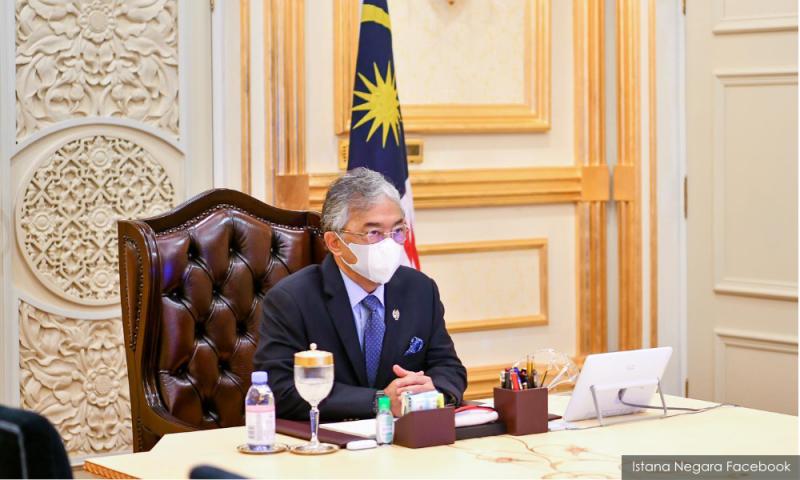LETTER | Constitutional crisis and parliamentary democracy
LETTER | The Muslim Youth Movement of Malaysia (Abim) refers to the statement issued by the attorney-general dated June 25, 2021. The main content of the statement revolves around Articles 39, 40(1) and (1A) of the Federal Constitution regarding the act of Yang di-Pertuan Agong, that was said to be limited by the advice given by the prime minister and the cabinet.
Generally, as per our constitutional monarchy system, the procedures and actions of the Agong are based on the provisions of law enshrined in the Federal Constitution.
At the same time, the statement concerns the oath of office for the Agong as enshrined in Article 37 and Part I of the Fourth Schedule of the Federal Constitution which states “therefore with this statement we solemnly and truly pledge allegiance to administer justice for Malaysia in accordance with the laws and the Constitution that has been ratified and promulgated and will be ratified and promulgated in the future.”
The attorney-general also explained that the situation during the emergency does not change in the same way as the situation outside the emergency, in that Agong's action is still subject to the advice of the prime minister and the cabinet based on the judgment in the case of N Madhavan Nair v Government of Malaysia [1975] 286.
Abim believes that the role of the constitutional monarch is to defend the rights of the people as well as to preserve the check and balance system and the practice of democracy in Malaysia.
Therefore, the actions of the Agong on the advice of the prime minister should be understood as being on the advice of the rakyat, as the prime minister should have the support of the majority of MPs elected by the people.
In the Federal Constitution, in addition to the concept of a constitutional monarch, the principle of parliamentary democracy is the basis of the system of separation of powers as enshrined in Chapter 4 of the Federal Legislature in the Federal Constitution.
In other words, if the powers of the Agong can be reviewed through the concept of a constitutional monarchy, the powers of the prime minister, including the power to advise the Agong, can also be reviewed and limited through the parliamentary democracy system.
Although there is an interpretation that the Federal Constitution is now suspended, including a provision that requires parliamentary sittings to be held following Section 18 and Section 14(1)(a) of the Emergency (Essential Powers) Ordinance 2021, Section 14(1)(b) of the Emergency Ordinance ( Necessary Powers) 2021 discloses that Parliament is still operating and subject to the discretion of the Agong. It states “Parliament shall be convened, prorogued, and dissolved on such date as the Agong thinks fit”.
In other words, the principle of parliamentary democracy is still recognised during the emergency and it is in the hands of the Agong to convene a sitting of Parliament.
From here we can observe the check and balance system that must be upheld to ensure that the rights of the people can be defended through a combination of the principles of constitutional monarchy and parliamentary democracy, even during an emergency situation.
The concept of a constitutional monarch cannot stand alone without the support of the principles of parliamentary democracy.
In fact, the action of the Agong to issue a decree for Parliament to convene immediately is in line with the concept of constitutional monarchy, which exists to ensure that the rights of the people are upheld.
At the same time, Article 44 of the Federal Constitution states that the Agong is a component of the Parliament, which emphasises the significant role played by the Agong in defending parliamentary democracy. Article 44 states that "Federal legislative power shall vest in Parliament which shall consist of the Agong and two Houses of Parliament known as the Dewan Negara and Dewan Rakyat."
Thus, through the decree of Agong together with the decree issued by the Conference of Rulers dated June 16, 2021, that Parliament be convened as soon as possible without the advice of the prime minister or the cabinet was an act that satisfies the Federal Constitution, and does not conflict with the concept of constitutional monarchy and parliamentary democracy.
However, if the power of the Agong to convene a sitting of Parliament during an emergency is subject to the advice of the prime minister or the cabinet, this means the principle of separation of powers between the executive and the legislature does not apply, and this opens the door to abuse of power by the executive.
This was once emphasised by Prof Owen Hood Phillips in his book Constitutional and Administrative Law (1973) who stated:
“Political liberty is to be found only when there is no abuse of power. But constant experience shows us that every man invested with power is liable to abuse it and to carry his authority as far as it will go ... To prevent this abuse, it is necessary from the nature of things that one power should be a check on another ... When the legislative and executive powers are united in the same person or body there can be no liberty. Again, there is no liberty if the judicial power is not separated from the legislative and the executive ... There would be an end of everything if the same person or body, whether of the nobles or of the people, were to exercise all three powers.”
Thus, the call by the Agong and the Malay Rulers to convene Parliament should not be ruled out based on the question of advice by the executive, as it is the only way to ensure a check and balance on the part of the executive during an emergency, especially as people’s lives are getting worse.
The writer is president of the Muslim Youth Movement of Malaysia (Abim).
The views expressed here are those of the author/contributor and do not necessarily represent the views of Malaysiakini.
RM12.50 / month
- Unlimited access to award-winning journalism
- Comment and share your opinions on all our articles
- Gift interesting stories to your friends
- Tax deductable

 Muhammad Faisal Abdul Aziz
Muhammad Faisal Abdul Aziz